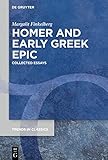Homer and Early Greek Epic : Collected Essays / Margalit Finkelberg.
Material type: TextSeries: Trends in Classics - Supplementary Volumes ; 89Publisher: Berlin ; Boston : De Gruyter, [2019]Copyright date: ©2020Description: 1 online resource (XVI, 402 p.)Content type:
TextSeries: Trends in Classics - Supplementary Volumes ; 89Publisher: Berlin ; Boston : De Gruyter, [2019]Copyright date: ©2020Description: 1 online resource (XVI, 402 p.)Content type: - 9783110671421
- 9783110671520
- 9783110671452
- online - DeGruyter
- Issued also in print.
| Item type | Current library | Call number | URL | Status | Notes | Barcode | |
|---|---|---|---|---|---|---|---|
 eBook
eBook
|
Biblioteca "Angelicum" Pont. Univ. S.Tommaso d'Aquino Nuvola online | online - DeGruyter (Browse shelf(Opens below)) | Online access | Not for loan (Accesso limitato) | Accesso per gli utenti autorizzati / Access for authorized users | (dgr)9783110671452 |
Browsing Biblioteca "Angelicum" Pont. Univ. S.Tommaso d'Aquino shelves, Shelving location: Nuvola online Close shelf browser (Hides shelf browser)

|

|

|

|

|

|

|
||
| online - DeGruyter Doing Things Together : A Theory of Skillful Joint Action / | online - DeGruyter Computational Intelligence : Theoretical Advances and Advanced Applications / | online - DeGruyter German Jews in the Era of the “Final Solution” : Essays on Jewish and Universal History / | online - DeGruyter Homer and Early Greek Epic : Collected Essays / | online - DeGruyter Xenophon on Violence / | online - DeGruyter Briefe : Historisch-kritische Ausgabe. Band 4, Briefe 1780 – 1781 / | online - DeGruyter Canonization and Alterity : Heresy in Jewish History, Thought, and Literature / |
Frontmatter -- Preface -- Contents -- List of Abbreviations -- List of the original publication venues -- Part I: Language and Diction -- 1. Is ΚΛΕΟΣ ΑΦΘΙΤΟΝ a Homeric Formula? -- 2. Homer’s View of the Epic Narrative: Some Formulaic Evidence -- 3. A Note on some Metrical Irregularities in Homer -- 4. Formulaic and Nonformulaic Elements in Homer -- 5. Homer, a Poet of an Individual Style -- 6. Oral Theory and the Limits of Formulaic Diction -- 7. More on ΚΛΕΟΣ ΑΦΘΙΤΟΝ -- 8. Late Features in the Speeches of the Iliad -- 9. Oral-Formulaic Theory and the Individual Poet -- 10. Equivalent Formulae for Zeus in Their Traditional Context -- Part II: Homer and Heroic Tradition -- 11. The First Song of Demodocus -- 12. A Creative Oral Poet and the Muse -- 13. How Could Achilles’ Fame Have Been Lost? -- 14. The Sources of Iliad 7 -- 15. The End of the Heroic Age in Homer, Hesiod and the Cycle -- 16. Homer and his Peers: Neoanalysis, Oral Theory, and the Status of Homer -- 17. Meta-Cyclic Epic and Homeric Poetry -- 18. The Formation of the Homeric Epics -- Part III: Homer’s Worlds and Values -- 19. Royal Succession in Heroic Greece -- 20. Odysseus and the Genus ‘Hero’ -- 21. Patterns of Human Error in Homer -- 22. Timē and Aretē in Homer -- 23. Homer and the Bottomless Well of the Past -- 24. Greece in the Eighth Century BCE and the ‘Renaissance’ Phenomenon -- Part IV: Transmission and Reception -- 25. Ajax’s Entry in the Hesiodic Catalogue of Women -- 26. The Cypria, the Iliad, and the Problem of Multiformity in Oral and Written Tradition -- 27. Homer as a Foundation Text -- 28. ‘She Turns about in the Same Spot and Watches for Orion’: ancient criticism and exegesis of Od. 5.274 = Il. 18.488 -- 29. Regional Texts and the Circulation of Books: The Case of Homer -- 30. Canonizing and Decanonizing Homer: Reception of the Homeric Poems in Antiquity and Modernity -- 31. Homer at the Panathenaia: Some possible Scenarios -- References -- General index -- Index of passages cited
restricted access online access with authorization star
http://purl.org/coar/access_right/c_16ec
This collection includes thirty scholarly essays on Homer and Greek epic poetry published by Margalit Finkelberg over the past three decades. The topics discussed reflect the author’s research interests and represent the main directions of her contribution to Homeric studies: Homer's language and diction, archaic Greek epic tradition, Homer's world and values, transmission and reception of the Homeric poems. The book gives special emphasis to some of the central issues in contemporary Homeric scholarship, such as oral-formulaic theory and the role of the individual poet; Neoanalysis and the character of the relationship between Homer and the tradition about the Trojan War; the multi-layered texture of the Homeric poems; the Homeric Question; the canonic status of the Iliad and the Odyssey in antiquity and modernity. All the articles are revised and updated. The book addresses both scholars and advanced students of Classics, as well as non-specialists interested in the Homeric poems and their journey through centuries.
Issued also in print.
Mode of access: Internet via World Wide Web.
In English.
Description based on online resource; title from PDF title page (publisher's Web site, viewed 28. Feb 2023)


